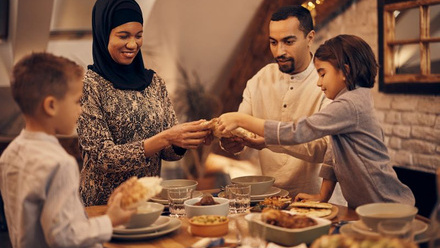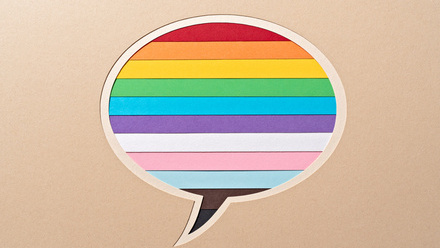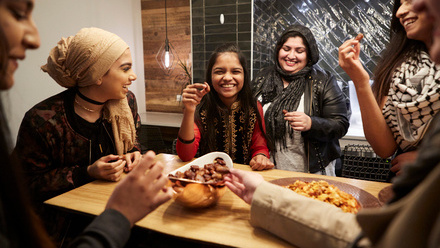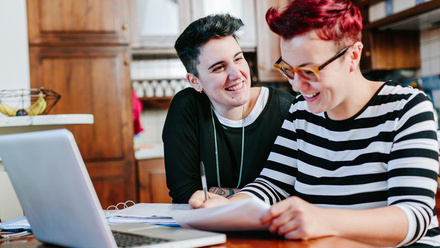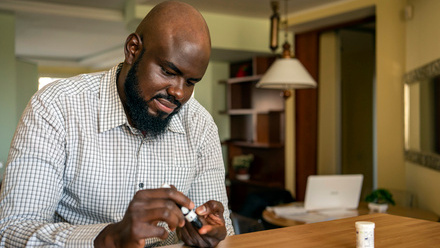As the start of Ramadan approaches, Registered Dietitian Carolina Frascina shares information about what Ramadan is, and how Dietitians can support their patients and colleagues during this holy month.
What is Ramadan?
Ramadan is practiced by Muslims worldwide as a month of fasting, prayer, reflection, practising kindness, patience and community. Muslims fast every day during the month from sunrise until sunset. This means they must completely abstain from all food and drink during this time. A meal is eaten before sunrise (suhoor) and after sunset (iftar).
Why is it important as Dietitians to be aware of Ramadan?
To effectively support our Muslim patients and our colleagues, it is important that as Dietitians, we have an awareness of Ramadan, what it is, what is involved and how this could potentially impact nutrition and hydration. A key component of Ramadan is fasting, which by its nature, means that fluid and nutritional intake is altered. This has implications for all individuals but additional consideration needs to be given to those whose dietary intakes may impact on their health and wellbeing e.g. an individual with diabetes.
The following information has been developed to increase awareness and cultural competency of our Dietetic workforce so that we can meet the needs of our patients and support our Muslim colleagues who may be fasting during the month of Ramadan.
Dates
Ramadan takes place on the ninth month of the Islamic calendar and follows the Lunar cycle. The exact dates vary each year and it lasts for 29 to 30 days. Ramadan 2022 is due to start in the evening on 2 April and will end on 1 May.
Fasting
Fasting is obligatory for all adults unless:
- physically or mentally unwell
- elderly
- pregnant/breastfeeding
A fast is voided if anything enters the mouth, throat, stomach or intestines.
It is important to note, some individuals who are chronically ill may still want to fast in view of special blessing and spiritual benefits despite being advised not to. The individual’s choice should be respected and advice offered to suit this. You may want to consider adjusting care plans accordingly by holding a multi-disciplinary meeting with involvement of a Muslim Chaplain/Imam, if available.
Examples of adjustments, with support of the multidisciplinary team include:
- Enteral feeding i.e., nasogastrointestinal/jejunal feeding regimens could potentially be adjusted to suit a fast
- Medications for conditions such as diabetes to suit changes in diet and lifestyle may also be explored
If the individual is exempt from fasting, they could make other lifestyle changes such as increased prayer and timing mealtimes to suit others in the household observing Ramadan. If able, individuals may want to make a donation or ‘Fidya’ to help feed others in need.
Considerations for colleagues observing Ramadan
- When Ramadan falls in the spring/summer months in the UK, days become gradually longer as Ramadan progresses. Mealtimes will vary slightly, becoming earlier and later to adjust with this.
- Many individuals will have changed their sleeping patterns during Ramadan. It might be helpful to consider moving appointments to work around prayer times if possible.
- Going for long periods without eating and drinking can cause dehydration and hunger. Some individuals may find this more severe during the first week of Ramadan as the body adjusts.
- Headaches, irritability, low mood, fatigue, dizziness and trouble concentrating are some side effects to consider during this time. Being aware of this, so that we can support our colleagues and patients, is important.
- Ramadan is a time of reflection, prayer, community and celebration. It is important quiet areas to accommodate prayer routines are provided.
- Friends and family involvement with self-catering should be encouraged where possible.
Nutrition and hydration: what to be aware of if you observe Ramadan
- Reducing caffeine intake in the week before Ramadan can be helpful. Switching to decaffeinated tea and coffee, herbal tea or water can reduce headaches and improve sleep quality
- Iftar or ‘breaking fast’ consists of water or milk, fruit and a full main meal. Hydrate well by including plenty of fluids such as water, sugar free cordial, milk, fruit juice (150ml a day), smoothies and fluid rich foods like soups and stews
- Split fluid goals evenly through iftar and suhoor. Drinking too much at once can be satiating and reduce appetite
- Reduce salt intake. Salt can cause increased thirst and dehydration during the fast. Be aware of processed foods like chutneys, sauces and cheese which have high salt content. Replace using spices and herbs to add flavour to food
- Eat plenty of fruit and vegetables to provide essential micronutrients, fibre and fluid
- Vitamin and minerals targets should be met if diet is well balanced, although an over-the-counter multivitamin may be appropriate. A 10mcg-a-day vitamin D supplement is also recommended during the months of Ramadan in the UK
To prevent weight loss
- Fortify foods by adding full fat milk and cream in smoothies, cream in soups, peanut butter to dates and extra tahini in hummus
- Split iftar into two or three meals to aid a 'little-and-often' approach to support fullness
To prevent weight gain
- Alternative cooking methods can be used to reduce fat intake, such as switching to an air fryer or grilling instead of frying
- At iftar, encourage a well-balanced meal, reducing quantities of high fat, sugar and salt food items
- Hydrate well with water, opt for sugar-free drinks and include lower-fat dairy alternatives in smoothies
- Be mindful when eating. Eat slowly and pay attention to fullness levels
Constipation
Bowel habits can change when different foods are introduced at different times. To help avoid or manage constipation aim to:
- Have plenty of fluids
- Continue to eat a fibre rich diet including a variety of fruit, vegetables and wholegrains
- Complete some gentle exercise like yoga and walking to help simulate bowel movements – UK recommendations are 30 minutes a day or 150 minutes spread throughout the week.
Eid
Eid-al-Fitr signifies the completion of the Holy Month of Ramadan and is celebrated on the first day of Shawwal (tenth month). Eid-al-Fitr is a time of celebration where people will come together, share food, exchange gifts and visit friends and family. During Eid, you may hear people say ‘Eid Mubarak’. This literally means ‘blessed Eid’ and is a way of expressing celebration.


